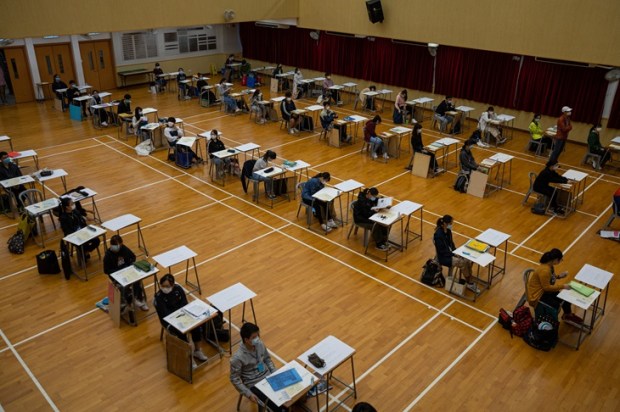In 1945, British author George Orwell said, ‘One has to belong to the intelligentsia to believe things like that: no ordinary man could be such a fool.’ While written 79 years ago, the current move by activists to decolonise the curriculum illustrates the relevance of Orwell’s observation.
Post-colonial academics argue that instead of being impartial and based on the search for truth, Western universities are enforcing a Eurocentric and white supremacist curriculum. In Australia, the UK, South Africa, and America (but not in Singapore, South Korea, Taiwan, or communist Russia and China) activists insist course work must be assessed, deconstructed, and cleansed.
Based on neo-Marxist critical theory and the rise of the Black Lives Matter movement, we are meant to believe that the way universities define, structure, and assess what is taught is inherently racist and oppressive and guaranteed to disadvantage and oppress black, African, and minority ethnic (BAME) students.
As a result, two UK-based academics, in a recent research paper, argue the white curriculum must be radically reshaped to ‘integrate marginalised voices, diverse cultural perspectives, and non-Eurocentric knowledge systems’.
The two academics are especially critical of STEM subjects, saying their supposed objectivity and impartiality ‘mask underlying colonial influences’ that can be traced to a time when colonial powers ‘used their perceived cultural and intellectual superiority as a means to justify their domination over colonised populations’.
Closed book examinations, in English, with time restrictions and ‘right’ and ‘wrong’ answers are also criticised as disadvantaging BAME students. Such assessment favours what the two academics call as ‘positivist’ view.
They also criticise a view of assessment where ‘knowledge is only recognised when it can be logically or mathematically proven or scientifically verified’. As an alternative, the academics argue assessment ‘must depart from traditional structures’ and embrace ‘decolonial elements that undo colonial practices and influences’.
Once the university assessment process has been decolonised, students will experience ‘an inclusive learning environment with a contextual awareness of our increasingly connected world, thereby transforming assessments from rigid constructs to adaptable instruments relevant and sensitive to individual students’ backgrounds and lives’.
For those still committed to rationality, reason, and objectivity it’s vital to realise the research paper in question is just one recent example of a cultural-Marxist inspired approach to rid the curriculum of whiteness.
In 2015, academics at a major Australian university argued ‘the dominance of whiteness in the curriculum is associated with systemic problems such as social inclusion, implicit bias, structural inequality, and intersectional discrimination’.
Also in 2015, students at an international university published 8 Reasons the Curriculum is White where they argue privileging Enlightenment science promotes an ideology where ‘people racialised as white are morally and intellectually superior’.
Not to be outdone, academics at another university argue that as ‘UK science is inherently white’ it’s impossible to argue it can be ‘objective and apolitical’. The academics also insist that European science ‘was both a fundamental contributor to European imperialism and a major beneficiary of its injustices’.
Such is the power of post-colonial theory and the push to decolonise the curriculum schools are also impacted. The Australian national mathematics curriculum asks students to study Aboriginal mathematical thinking, including ‘algebraic thinking’.
An outline of the science curriculum states, ‘First Nations Australians have worked scientifically for millennia and continue to provide significant contributions to developments in science.’ So much for Pythagoras, Archimedes, Ptolemy, and Enlightenment thinkers including Kant and Newton.
In New Zealand, controversy recently erupted over the move to include Maori knowledge in the science and mathematics curriculums. Once again, the assumption is that how such disciplines are structured and taught, instead of being objective and impartial, are cultural constructs.
As argued by Winston in Orwell’s 1984, one of the most sinister and effective ways Big Brother and the Party enforce domination is by employing mind control and group think. No matter how illogical or irrational, whatever the Thought Police enforce must be endorsed.
Such is the all-powerful mind control enforced by the Party, Winston concludes, ‘In the end the Party would announce that two and two make five, and you would have to believe it. It was inevitable that they should make that claim sooner or later.’
The move to decolonise the curriculum (by painting STEM subjects as white supremacist cultural constructs and insisting there is nothing preferable or superior about Enlightenment thinking or Western science) mirrors what Orwell warns about.
If subjects like science and mathematics are nothing more than cultural constructs, then there truly will be a time when four plus four equals five.
Dr Kevin Donnelly is a senior fellow at the ACU’s PM Glynn Institute and author of Wake Up To Woke; It’s Time Australia. Available at kevindonnelly.com.au

























